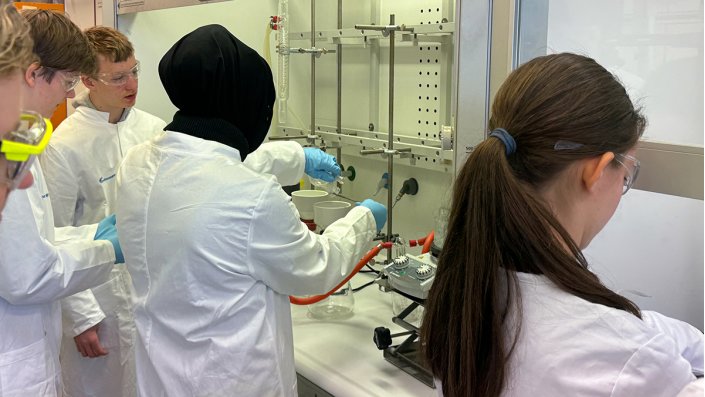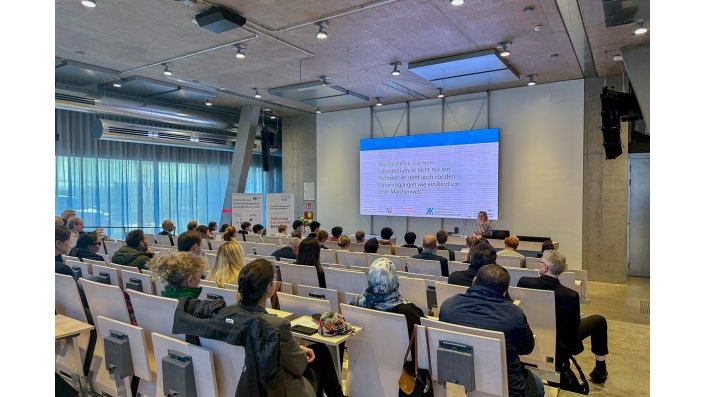Olympic atmosphere at the Leverkusen campus

More than 1,300 students from all over Germany have competed in this round to take part in the final of the 57th International Chemistry Olympiad in Dubai. The 20 best participants from North Rhine-Westphalia prepared for the third round of the competition at a state seminar lasting several days at the Faculty of Applied Sciences at TH Köln.
The 20 young researchers have already completed two rounds of the International Chemistry Olympiad in recent months. After successfully completing a written exam and a term paper, four pupils from NRW can now qualify for the third round of the final 60 pupils from all over Germany. At the state seminar, they deepened their knowledge of chemistry and gained their first laboratory experience as well as deep insights into the world of chemistry.
"We are really delighted that we were able to welcome the 20 best students from NRW to this state seminar of the International Chemistry Olympiad at the Leverkusen campus of TH Köln for the fourth time," says Professor Dirk Burdinski, Dean of Studies at the Faculty of Applied Natural Sciences.
A highlight of the preparatory seminar was a laboratory day on which the students produced the active pharmaceutical ingredient acetylsalicylic acid, known from many painkillers, themselves. Under supervision, they carried out chemical analyses, compared their results with the original substance and determined the purity of their product. "This year, we have prepared a series of experiments involving the production of a chemical product as well as its analysis and characterisation. When selecting the experiment, it was important to us that we could train as many working techniques as possible with the students that are typical for chemistry and at the same time use modern analysis methods," explains Professor Dirk Burdinski.
Picture Gallery
 0 / 0
0 / 0
20 pupils from all over North Rhine-Westphalia were at TH Köln as part of the Chemistry Olympiad. (Image: TH Köln - Media Lab)
 0 / 0
0 / 0
Their task: to synthesise the active pharmaceutical ingredient acetylsalicylic acid, which is the basis of many painkillers. (Image: TH Köln - Media Lab)
 0 / 0
0 / 0
To isolate the solid, the students added the reaction mixture to the BÜCHNER funnel. (Image: TH Köln - Media Lab)
 0 / 0
0 / 0
In einem weiteren Schritt prüften sie den pH-Wert des Waschwassers mit einem pH-Papier. (Image: TH Köln - Media Lab)
 0 / 0
0 / 0
A student looks at the finished reaction product before filtration. (Image: TH Köln - Media Lab)
 0 / 0
0 / 0
Two students are delighted with their practical yield: the dry product acetylsalicylic acid. (Image: TH Köln - Media Lab)
"The Chemistry Olympians from the second round of the Chemistry Olympiad in NRW had the opportunity to experience a laboratory day at TH Köln that would otherwise not have been possible at school," says Dr Simon Scheeren, NRW State Representative of the International Chemistry Olympiad. The young chemists were also impressed. "The lab day was definitely a highlight. We had never worked with chemical substances and chemical laboratory equipment such as reflux condensers, vacuum pumps or BÜCHNER funnels before," reported one pupil.
The seminar concluded with a ceremony at the Leverkusen campus with the pupils, their parents and teachers, as well as Ines Op de Hipt, Head of the STEM Department of the Ministry of Schools and Education of North Rhine-Westphalia. In her speech, she emphasised the importance of the Chemistry Olympiad: "This competition makes an important contribution to recognising and promoting talent. In this way, the International Chemistry Olympiad complements and supports school work in a special way. Even the requirements in the first round often go beyond what is stipulated in the chemistry curriculum."
The International Chemistry Olympiad (IChO) is a global competition in which pupils from currently 85 countries take part. The aim is to arouse interest and enthusiasm for the subject of chemistry by posing exciting questions. More than 1,300 chemistry enthusiasts took part in this year's German competition. With the support of Andrea Küsters and Dr Simon Scheeren, they work on both theoretical and practical chemistry questions in several rounds until a German team is selected for the international round.
April 2025



